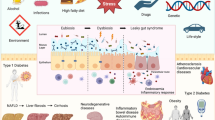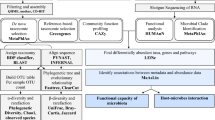Abstract
Human gut microbiota are a huge and complex microbial community, which is recognized to play a significant role in regulating host metabolism. However, the destruction of gut microbiota leads to the pathological response of host, and thus results in a variety of metabolic diseases. This article gives a brief review of research progress on gut microbiota and some main metabolic diseases, including osteoporosis, obesity, type 2 diabetes, non-alcoholic fatty liver, and hypertension, with a specific focus on the effect of gut microbiota on diseases’ occurrence and development. In addition, this review article also shows some case studies on the regulation of gut microbiota by new means, such as fecal microbiota transplantation and oral probiotics. Although gut microbiota are considered as a promising novel target for the treatment of metabolic diseases, it is also necessary to encourage further studies to provide more valuable data for guiding the application of gut microbiota on disease therapy in future.

Similar content being viewed by others
References
Abenavoli L, Scarpellini E, Rouabhia S, Balsano C, Luzza F (2013) Probiotics in non-alcoholic fatty liver disease: which and when. Ann Hepatol 12:357–363
Alves-Bezerra M, Cohen DE (2017) Triglyceride metabolism in the liver. Compr Physiol 8:1–8
Aron-Wisnewsky J, Clément K, Nieuwdorp M (2019) Fecal microbiota transplantation: a future therapeutic option for obesity/diabetes? Curr Diab Rep 19:51
Augustyn M, Grys I, Kukla M (2019) Small intestinal bacterial overgrowth and nonalcoholic fatty liver disease. Clin Exp Hepatol 5:1–10
Britton RA, Irwin R, Quach D et al (2014) Probiotic L. reuteri treatment prevents bone loss in a menopausal ovariectomized mouse model. J Cell Physiol 229:1822–1830
Burt AD, Lackner C, Tiniakos DG (2015) Diagnosis and assessment of NAFLD: definitions and histopathological classification. Semin Liver Dis 35:207–220
Byrne CD, Targher G (2020) What’s new in NAFLD pathogenesis, biomarkers and treatment? Nat Rev Gastroenterol Hepatol 17:70–71
Chatterjee S, Khunti K, Davies MJ (2017) Type 2 diabetes. Lancet 389:2239–2251
Chen YM, Liu Y, Zhou RF et al (2016) Associations of gut-flora-dependent metabolite trimethylamine-N-oxide, betaine and choline with non-alcoholic fatty liver disease in adults. Sci Rep 6:19076
Farr JN, Rowsey JL, Eckhardt BA et al (2019) Independent roles of estrogen deficiency and cellular senescence in the pathogenesis of osteoporosis: evidence in young adult mice and older humans. J Bone Miner Res 34:1407–1418
Fava F, Rizzetto L, Tuohy KM (2019) Gut microbiota and health: connecting actors across the metabolic system. Proc Nutr Soc 78:177–188
Fei N, Zhao L (2013) An opportunistic pathogen isolated from the gut of an obese human causes obesity in germfree mice. ISME J 7:880–884
Fuchs C, Claudel T, Trauner M (2013) Bile acid-mediated control of liver triglycerides. Semin Liver Dis 33:330–342
Gao B, Duan Y, Lang S et al (2020) Functional microbiomics reveals alterations of the gut microbiome and host co-metabolism in patients with alcoholic hepatitis. Hepatol Commun 4:1168–1182
Geng Q, Gao H, Yang R, Guo K, Miao D (2019) Pyrroloquinoline quinone prevents estrogen deficiency-induced osteoporosis by inhibiting oxidative stress and osteocyte senescence. Int J Biol Sci 15:58–68
Heiss CN, Olofsson LE (2018) Gut microbiota-dependent modulation of energy metabolism. J Innate Immun 10:163–171
Hsu E, Pacifici R (2018) From osteoimmunology to osteomicrobiology: how the microbiota and the immune system regulate bone. Calcif Tissue Int 102:512–521
Jiao N, Baker SS, Chapa-Rodriguez A et al (2018) Suppressed hepatic bile acid signalling despite elevated production of primary and secondary bile acids in NAFLD. Gut 67:1881–1891
Khalesi S, Sun J, Buys N, Jayasinghe R (2014) Effect of probiotics on blood pressure: a systematic review and meta-analysis of randomized, controlled trials. Hypertension. https://doi.org/10.1161/HYPERTENSIONAHA.114.03469
Lee HY, Park JH, Seok SH et al (2006) Human originated bacteria, Lactobacillus rhamnosus PL60, produce conjugated linoleic acid and show anti-obesity effects in diet-induced obese mice. Biochim Biophys Acta 1761:736–744
Li L, Wang Z (2018) Ovarian aging and osteoporosis. Adv Exp Med Biol 1086:199–215
Li J, Zhao F, Wang Y et al (2017) Gut microbiota dysbiosis contributes to the development of hypertension. Microbiome 5:14
Li F, Sun G, Wang Z et al (2018) Characteristics of fecal microbiota in non-alcoholic fatty liver disease patients. Sci China Life Sci 61:770–778
Louca P, Nogal A, Wells PM et al (2021) Gut microbiome diversity and composition is associated with hypertension in women. J Hypertens 39:1810–1816
Ma YY, Li L, Yu CH, Shen Z, Chen LH, Li YM (2013) Effects of probiotics on nonalcoholic fatty liver disease: a meta-analysis. World J Gastroenterol 19:6911–6918
Macia L, Tan J, Vieira AT et al (2015) Metabolite-sensing receptors GPR43 and GPR109A facilitate dietary fibre-induced gut homeostasis through regulation of the inflammasome. Nat Commun 6:6734
Marques FZ, Nelson E, Chu PY et al (2017) High-fiber diet and acetate supplementation change the gut microbiota and prevent the development of hypertension and heart failure in hypertensive mice. Circulation 135:964–977
Ohlsson C, Sjgren K (2015) Effects of the gut microbiota on bone mass. Trends Endocrinol Metab 26:69–74
Oliphant K, Allen-Vercoe E (2019) Macronutrient metabolism by the human gut microbiome: major fermentation by-products and their impact on host health. Microbiome 7:91
Park S, Ji Y, Jung HY et al (2017) Lactobacillus plantarum HAC01 regulates gut microbiota and adipose tissue accumulation in a diet-induced obesity murine model. Appl Microbiol Biotechnol 101:1605–1614
Petersen C, Bell R, Klag KA et al (2019) T cell-mediated regulation of the microbiota protects against obesity. Science. https://doi.org/10.1126/science.aat9351
Plottel CS, Blaser MJ (2011) Microbiome and malignancy. Cell Host Microbe 10:324–335
Postler TS, Ghosh S (2017) Understanding the holobiont: how microbial metabolites affect human health and shape the immune system. Cell Metab 26:110–130
Ridaura VK, Faith JJ, Rey FE et al (2013) Gut microbiota from twins discordant for obesity modulate metabolism in mice. Science 341:1241214
Santisteban MM, Qi Y, Zubcevic J et al (2016) Hypertension-linked pathophysiological alterations in the gut. Circ Res 120:312
Schünemann M, Oette M (2015) Fecal microbiota transplantation. Naturop Doctor News Review 28:798–799
Sebastián DJ, Sánchez SC (2018) From the intestinal flora to the microbiome. Rev Esp Enferm Dig 110:51–56
Sebastián-Domingo JJ, Sánchez-Sánchez C (2017) From the intestinal flora to the microbiome. Rev Esp Enferm Dig 1:51–56
Shaaban SY, El GY, Mehanna NS, El-Senousy WM, El-Feki H, Saad K, El-Asheer OM (2018) The role of probiotics in children with autism spectrum disorder: a prospective, open-label study. Nutr Neurosci 21:676–681
Soleimani A, Zarrati MM, Bahmani F et al (2017) Probiotic supplementation in diabetic hemodialysis patients has beneficial metabolic effects. Kidney Int 91:435–442
Stewart CJ, Ajami NJ, Brien JO et al (2018) Temporal development of the gut microbiome in early childhood from the TEDDY study. Nature 562:583–588
Thingholm LB, Rühlemann MC, Koch M et al (2019) Obese individuals with and without type 2 diabetes show different gut microbial functional capacity and composition. Cell Host Microbe 26:252–264
Tianmin L, Zhao Y, Yunfeng B et al (2019) Screening of Lactobacillus with hypoglycemic activity and evaluation of assistant hypoglycemic effects. J Northeast Agric Sci 44:91–96
Tremaroli V, Karlsson F, Werling M et al (2015) Roux-en-Y gastric bypass and vertical banded gastroplasty induce long-term changes on the human gut microbiome contributing to fat mass regulation. Cell Metab 22:228–238
Tyagi AM, Darby TM, Hsu E et al (2021) The gut microbiota is a transmissible determinant of skeletal maturation. Elife. https://doi.org/10.7554/eLife.64237
Valdes AM, Walter J, Segal E, Spector TD (2018) Role of the gut microbiota in nutrition and health. BMJ 361:K2179
Valenzuela PL, Carrera-Bastos P, Gálvez BG, Ruiz-Hurtado G, Ordovas JM, Ruilope LM, Lucia A (2021) Lifestyle interventions for the prevention and treatment of hypertension. Nat Rev Cardiol 18:251–275
Vallianou N, Stratigou T, Christodoulatos GS, Dalamaga M (2019) Understanding the role of the gut microbiome and microbial metabolites in obesity and obesity-associated metabolic disorders: current evidence and perspectives. Curr Obes Rep 8:317–332
Virtue AT, McCright SJ, Wright JM et al (2019) The gut microbiota regulates white adipose tissue inflammation and obesity via a family of microRNAs. Sci Transl Med. https://doi.org/10.1126/scitranslmed.aav1892
Vrieze A, Van Nood E, Holleman F et al (2012) Transfer of intestinal microbiota from lean donors increases insulin sensitivity in individuals with metabolic syndrome. Gastroenterology 143:913–916
Wang W, Shi LP, Shi L, Xu L (2018) Efficacy of probiotics on the treatment of non-alcoholic fatty liver disease. Zhonghua Nei Ke Za Zhi Chin J Intern Med 57:101–106
Wang H, Lu Y, Yan Y et al (2019) Promising treatment for type 2 diabetes: fecal microbiota transplantation reverses insulin resistance and impaired islets. Front Cell Infect Microbiol 9:455
Wen Y, Zhu Y, Wan C, Gao X, Liu G (2016) Efficacy of probiotics in non-alcoholic fatty liver disease in adult and children: a meta-analysis of randomized controlled trials: 1226–1233
Wu F, Guo X, Zhang M et al (2020) An Akkermansia muciniphila subtype alleviates high-fat diet-induced metabolic disorders and inhibits the neurodegenerative process in mice. Anaerobe 61:102138
Yang T, Santisteban MM, Rodriguez V et al (2015) Gut dysbiosis is linked to hypertension. Hypertension 65:1331–1340
Zhang Z, Tang H, Chen P, Xie H, Tao Y (2019) Demystifying the manipulation of host immunity, metabolism, and extraintestinal tumors by the gut microbiome. Signal Transduct Target Ther 4:41
Zhou D, Pan Q, Shen F, Cao HX, Ding WJ, Chen YW, Fan JG (2017) Total fecal microbiota transplantation alleviates high-fat diet-induced steatohepatitis in mice via beneficial regulation of gut microbiota. Sci Rep 7:1529
Acknowledgements
We acknowledge the authors for their continued hard work.
Funding
This work was financially supported by the National Natural Science Foundation of China (32101368), Natural Science Foundation of Hunan Province (2020JJ5709), and Science and Technology Plan Project for Natural Resources of Hunan Province (2021-50).
Author information
Authors and Affiliations
Contributions
QS and LD contributed to writing the initial draft. QZ contributed to drawing the charts. XZ contributed to reviewing and revising the paper, and the financial support for this work.
Corresponding author
Ethics declarations
Conflict of interest
The authors declare that they have no conflict of interest.
Consent to participate
All authors approved the manuscript.
Consent for publication
Written informed consent for publication was obtained from all participants.
Additional information
Communicated by Erko Stackebrandt.
Publisher's Note
Springer Nature remains neutral with regard to jurisdictional claims in published maps and institutional affiliations.
Rights and permissions
About this article
Cite this article
Shi, Q., Dai, L., Zhao, Q. et al. A review on the effect of gut microbiota on metabolic diseases. Arch Microbiol 204, 192 (2022). https://doi.org/10.1007/s00203-022-02802-3
Received:
Revised:
Accepted:
Published:
DOI: https://doi.org/10.1007/s00203-022-02802-3




